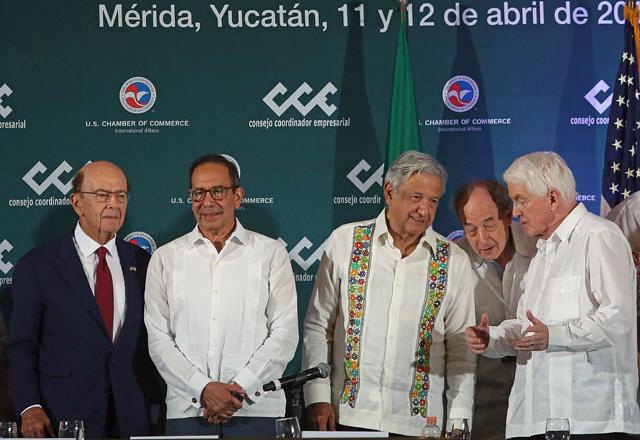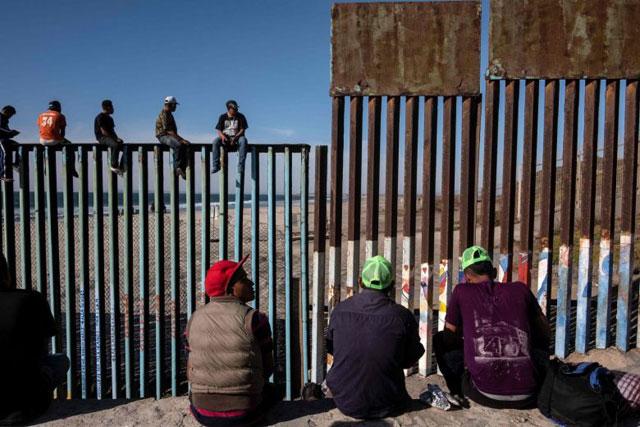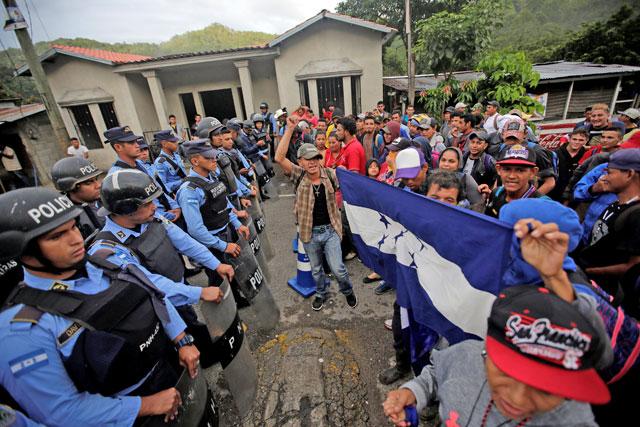You are here
Mexican, US business leaders urge Trump to drop steel tariffs
By Reuters - Apr 13,2019 - Last updated at Apr 13,2019

From left to right: US Commerce Secretary Wilbur Ross, Mexican businessman and CEO of the Business Coordinating Council Carlos Salazar, Mexican President Andres Manuel Lopez Obrador, Mexican businessman Guillermo Vogel and US Chamber of Commerce President and CEO Tom Donohue, are seen in this photo, after signing agreements between the private sectors of Mexico and US at the ‘Dialogue and Business Summit for Investment in Mexico’ in Merida, State of Yucatan, Mexico, on Friday (AFP photo)
MERIDA, Mexico — Mexican and US business leaders on Friday pushed back against President Donald Trump's threats to close the US-Mexico border and urged him to drop steel tariffs that have hindered the ratification of a trade deal brokered last year.
At a meeting in the eastern Mexican city of Merida attended by government officials from both countries, business lobbies united to call on Trump to drop his threats to disrupt border trade after days of hold-ups on the frontier.
Describing the US-Mexico relationship as a top priority, US Chamber of Commerce head Tom Donohue told a news conference the United States should exempt Mexico and Canada from steel and aluminum tariffs imposed by Trump last June before its Congress approves the deal struck to replace the North American Free Trade Agreement.
"That is why we are the first out of the gate to warn against the disastrous consequences of closing the US-Mexican border," Donohue said, sitting next to Mexican President Andres Manuel Lopez Obrador, who warmly applauded his speech.
Mexico is the United States' second biggest export market, and third biggest trading partner. US-Mexico trade is worth about half-a-trillion dollars a year.
Mexico and Canada want Trump to drop the metals tariffs before their lawmakers approve the deal agreed in September known as the United States-Mexico-Canada Agreement (USMCA).
Tensions over the border are further hindering the process.
Following a surge in asylum seekers who mostly travelled through Mexico from Central American countries, Trump last month threatened to close the border if Mexico did not immediately halt illegal immigration. His government then redeployed border agents to police the frontier, sparking delays which have cost businesses on both sides millions of dollars.
After Donohue spoke, Carlos Salazar, president of Mexico's powerful CCE business lobby, weighed in to say he hoped the US government understood the need to keep the border open.
"And let's not confuse migration problems with trade problems and industry problems," Salazar said, seated on the other side of Lopez Obrador, who again applauded the speech.
Lopez Obrador himself, as he has for months, avoided any implicit or explicit criticism of Trump, instead offering thanks to the American president for "being open to deal with our commercial, migratory and security matters with respect".
Trump's Commerce Secretary Wilbur Ross looked on, seated next to Salazar, but did not address the news conference.
The event was part of the latest iteration of a recurring business forum known as the US-Mexico CEO Dialogue.
On the sidelines, Mexican Economy Minister Graciela Marquez met Ross and again urged the United States to end the metals tariffs for Mexico, part of a set of national security measures Trump had ordered under the so-called "Section 232" mechanism.
In addition, the minister asked that Ross push forward talks aimed at reaching a quick deal in a stop-start tomato dispute between Mexican and US producers.
Marquez was able to tout a workers' rights bill that Mexico's lower house of Congress approved late on Thursday, legislation that US House of Representatives Speaker Nancy Pelosi has called for to win Democratic support for USMCA.
US Deputy Energy Secretary Dan Brouillette met Mexico's Energy Minister Rocio Nahle and later said she had indicated to him that her government did not plan to roll back an energy overhaul passed by the previous administration.
The 2013-14 reform opened up oil production and exploration to private capital, drawing significant interest from US investors. At the time, Lopez Obrador roundly attacked the reform. However, he has since said he will give private operators time to show that they can increase output.
Lopez Obrador wants to revive state oil company Pemex and plans to build an $8 billion refinery in his home state of Tabasco. A US embassy spokesman said that Mexican officials hoped to help fund the project by reducing tax evasion.
Related Articles
MEXICO CITY — Mexico’s president said on Tuesday the 15,000 troops his government has deployed to the US border do not have orders to stop m
WASHINGTON — US President Donald Trump threatened on Thursday to send the military to the Mexican border and to imperil a trade deal in an i
AMMAN — His Majesty King Abdullah on Monday sent a cable to Mexican President-elect Andres Manuel Lopez Obrador, congratulating him over his


















